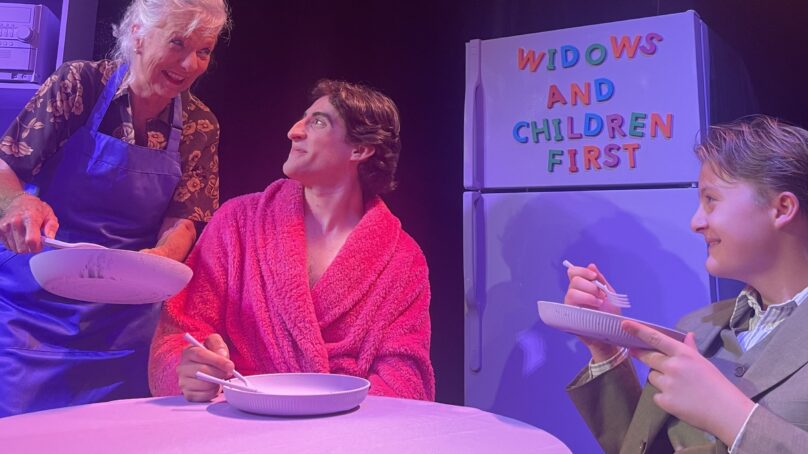

Ma (Lourelene Snedeker), Arnold Beckoff (Alex Martinez) and David (Jackson Goddard) in an upbeat scene from Plays of Wilton’s powerful production of Harvey Fierstein’s Torch Song.
By AARON KRAUSE
“There’s still a stain on the sidewalk,” teenage David tells Ed in Harvey Fierstein’s classic, complex, and relevant play, Torch Song. The adolescent is referring to a literal mark. It remains from a deadly attack in which a group of kids beat protagonist Arnold Beckoff’s boyfriend, Alan, to death. But a deeper, metaphorical stain has marked the LGBTQ community long before the Stonewall riots in 1969 — and it still persists in 2025. This mark has worsened recently amid a growing climate of division, hatred, and violence in government and society. This dangerous trend threatens to roll back hard-won progress, especially in gay rights. The blemish’s rawness is a primary reason why the award-winning Torch Song, written in the late 1970s/early ’80s and premiering around that time, remains a vital, urgent, and resonant piece of theater today.
Undoubtedly, Plays of Wilton (POW) is staging a visceral, intimate professional production through Aug. 31. The venue is the 54-seat Foundry in Wilton Manors, near Ft. Lauderdale. Under POW Artistic Director Ronnie Larsen’s thoughtful direction, this production showcases talented performers Alex Martinez, Pam Hankerson, Christian Cooper, Lourelene Snedeker, Gianni Palermo, and Jackson Goddard.
The production runs roughly two hours and 45 minutes, including an intermission. That is down significantly from the four-hour original work, Torch Song Trilogy. This is a condensed version, but although it’s shorter it doesn’t sacrifice heart or humanity.
Torch Song is a semi-autobiographical work by Fierstein. He is a theater artist whose strength lies in his ability to blend biting humor, emotional honesty, and political urgency in a deeply personal way. The play follows Beckoff, a witty and emotionally forthright Jewish drag queen and torch singer. He lives in New York City during the late 1970s and early ’80s.
Over the course of the story, Beckoff navigates a complex relationship with his bisexual lover, Ed. The latter is a man torn between societal expectations and his attraction to Beckoff. Cooper plays Ed with an air of disappointment, as though life has not been particularly good to him. And we sense his conflict between his love for Laurel and his relationship with Beckoff.
Beckoff and Ed’s strained love story unfolds alongside the former’s experience of profound loss with the murder of his partner, Alan, and culminates in his fight to build a nontraditional family. Beckoff raises his gay teenage foster son, David, while confronting his loving but traditionally minded and somewhat disapproving mother. The playwright only names her “Ma.”
Torch Song blends humor and heartbreak. Ultimately, it paints a deeply human portrait of resilience, self-worth, and the universal longing for others to notice and love us for who we authentically are.
The act titles — International Stud, Fugue in a Nursery, and Widows and Children First! — chart Arnold’s emotional journey. From cruising bars to domestic aspirations to finding healing in nontraditional family, each section reflects the shifting forms of connection and identity.
At the heart of this production is Larsen’s staging. It powerfully reinforces Beckoff’s desire to fully matter. The director blurs the line between Beckoff’s world and that of the audience. Indeed, multiple times characters emerge from the seating area, directly addressing and even physically touching audience members. This breaking of the fourth wall matters because it forces audiences to confront Beckoff’s world personally. It transforms Beckoff’s struggle from something distant into something immediate and real.
When characters step into the seating area and engage with viewers, the play transforms from a distant story into a shared experience. This heightens Beckoff’s yearning for others to truly see and accept him.
Thanks to Martinez’s nuanced performance as Beckoff, we not only accept him, we pull for him and, ultimately, we love him. That is because Martinez believably balances Beckoff’s sharp humor with a moving vulnerability that touches our hearts. We recognize Beckoff and relate to him when, for instance, the young man admits to his mother, in a soft but sincere voice, that he misses Alan. To make the moment even more powerful, Martinez’s Beckoff could fight back tears. However, without question, we feel for the characters as they hug tightly after his mother comforts him. Perhaps, through them, you recognize your own interactions with your mother.
As Martinez deftly portrays him, Beckoff is a well-drawn, complex person. He is a nebbish with a lot on his mind. At times, Martinez’s Beckoff feels like a pressure cooker of emotion simmering beneath the surface. It’s as if it’s begging for release. When that anger erupts, it’s like lava pouring from Niagara Falls. The actor scowls, and his voice drips with sarcasm and fury as he thunderously notes how folks have made gay people feel less than human. Certainly, we understand the source of the character’s anger. We never sense even remotely that Martinez’s Beckoff is spiteful.
Beckoff has experienced unrequited love in real life, and he sings about such love on the stage. He is a drag queen who sings torch songs, hence the play’s title. These are musical pieces that describe situations such as one-sided romance and lost love. Through Fierstein’s clever structuring of Torch Song, transitions between scenes feature numbers such as “Killing Me Softly.”
Undoubtedly, Hankerson is another standout and takes on multiple roles. She sensitively and believably portrays Ed’s wife, Laurel. Additionally, she plays the torch singer who performs during scene transitions. Truly, Hankerson, often sporting a shimmering outfit (Tim Bowman designed the striking, character-revealing costumes), sparkles during these musical moments. Indeed, she conveys elegance, candor, and longing as she sings these mood-enhancing numbers that describe the kind of feelings Beckoff may be experiencing. In that way, the torch singer in Torch Song functions much like a Greek chorus. She offers musical commentary that reflects and deepens Beckoff’s emotions and experiences.
In addition to her role as the torch singer, Hankerson portrays Laurel with a warm restraint that feels genuine. Laurel is clearly a woman full of life. And she’s seeking the same basic desires as anyone else — love, connection, and understanding. Hankerson and Cooper, who plays Ed, share palpable chemistry, making their relationship believable as both tender and strained. They come across as a couple who care deeply for each other but are grappling with unresolved tensions. Meanwhile, Laurel and Beckoff maintain a civil, even cautious, respect toward one another. This adds a subtle but important layer to the story’s emotional complexity.
Amidst the dynamic staging and powerful ensemble work, Snedek’s portrayal of Ma stands out for its subtlety and depth. In lesser hands, Ma might come across as a stereotypical Jewish mother who is merely loud, funny, and meddling. But Snedek, a four-time Carbonell Award winner, never allows her character to become a caricature. Rather, she makes us sense the sincere ache and love residing within this unnamed mother.
In Snedek’s hands, this motherly Ma becomes a well-meaning traditional woman. She is having trouble adapting to her son’s way of life because it is foreign to her. Ma was happily married to her husband for more than 30 years. While Beckoff may have mentioned his homosexuality to his mother over the years, his mother’s acceptance seems tentative. Perhaps she acknowledged her son’s homosexuality briefly but then quickly turned away, overwhelmed or unsure how to respond. Now, everything Ma has not said to her son is bubbling within her. It’s itching to come out — much like her son’s emotions awaiting release.
Like her son, Snedek’s Ma becomes angry and passionate. But rather than spewing spite, we sense a vulnerable woman aching for connection with her son but disappointed with his decisions. Perhaps Ma calls to mind Katharine in Terrence McNally’s moving drama, Mothers and Sons. Both women embody the struggles of an older generation to reconcile deep maternal love with discomfort and misunderstanding of their sons’ lives. In Torch Song’s case, this generational tension adds realism and emotional depth to this richly layered play.
To be sure, Snedek’s Ma elicits humor — particularly after she tells her son that someday he might meet a “nice girl.”
“Maaaa!” Beckoff annoyingly and embarrassingly responds, as though he is a teenager and his mother just invaded his privacy.
Speaking of teenage boys, in the play we meet 15-year-old David, whom Beckoff is fostering. The youth presents yet another source of conflict between Beckoff and his mother. Indeed, Ma is a product of a more conservative, traditional upbringing. As her parents raised her, family and parenting roles were more rigidly defined. Beckoff’s role as a gay man raising a foster son challenges Ma’s notions of what a “family” should look like. She may simply struggle to imagine how her son can provide a stable home in the way she envisions. This tension between Beckoff and his mother reflects the broader generational clash around LGBTQ+ issues at the time.
In contrast to the big emotions that Beckoff and his mother often express, David is more of a role based in restraint. The youth seems comfortable in his sexuality and generally happy with his life. Goddard, who has shined several times recently on POW’s stage, convincingly portrays David as a charming, content, somewhat effeminate boy. Clearly, he is not as high-strung as Beckoff. While casting the role of a child or teenager, a director can cheat by employing an older actor who could pass for a child or adolescent. But Larsen wisely casts Goddard, a ninth grader who is quickly becoming a performer to watch.
Behind the scenes, Melqui Dominguez’s set is realistic and grounded. It gives the audience a clear sense of the domestic and urban spaces Arnold inhabits. However, perhaps adding a few more period-specific props or décor would help more clearly convey the late 1970s/early 80s New York City vibe. A collection of stuffed animals scattered around a large bed adds a subtle but poignant touch. It evokes childhood innocence and Arnold’s longing for emotional comfort and connection.
Preston Bircher’s lighting adds atmosphere. It shifts moods subtly between scenes — from intimate, warm moments to more tense or dramatic ones. Most impressive are Bircher’s intense red hues, reinforcing the passion and strong emotions in the story. At least one scene that features heavy stage fog uses lighting to heighten tension. And it creates a haunting, almost surreal effect. This draws the audience deeper into Beckoff’s emotional world. It’s a world that POW’s production neatly merges with our world in 2025, reflecting Torch Song’s urgency and timeliness during a volatile time. Indeed, renewed efforts to challenge or even abolish same-sex marriage rights are deeply concerning.
Although Torch Song’s final act doesn’t neatly tie up every knot, Fierstein’s compassionate language leaves us with genuine hope. And with its stirring direction and dedicated cast, POW—recently named “Best Theater Company” by Miami New Times—brings Fierstein’s vision alive with heart and authenticity.
IF YOU GO
WHAT: POW’s production of Harvey Fierstein’s Torch Song
WHEN: Through Aug. 31. Showtimes are 8 p.m. Thursday-Saturday and 3 p.m. Sunday.
WHERE: The Foundry, 2306 Dixie Highway in Wilton Manors
TICKETS: Prices start at $37.50. Call (954) 826-8790 or visit www.playsofwilton.com.

